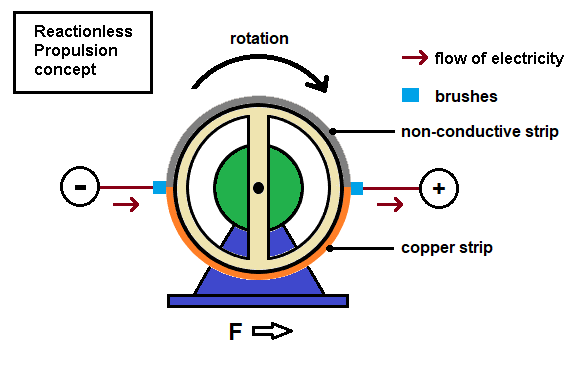I believe that a conductor which is physically moving in the opposite direction to the flow of electricity will result in the motion of the conductor being resisted and this resistance will cause the mechanism which is moving the conductor to experience a propelling force.
Please reference the conceptual drawing below.
This is showing a non-conducting disc (i.e. PVC) which is attached to an electric motor (colored green). Along half of the outer perimeter of this disc is a strip of non-conductive material and the other half is a strip of copper. The strip of non-conductive material is used primarily as a counterweight for the strip of copper so the disc will be balanced.
During each revolution of the disc, there will be two momentary DC electrical current flows across the copper strip via contact with the two brushes (colored light blue).
When electricity has to flow against the physical flow of the copper atoms of the copper strip (as shown in the drawing), it should produce a drag on the copper atoms and this resistance should result in the electric motor having to apply more torque to maintain its set RPM and this should cause the motor to move via Newton’s 3rd Law of Motion.
When electricity flows in the same direction that the copper strip is moving in (such as when the copper strip is positioned along the top half of the disc) there should be no drag. Instead, the flow of electricity across it should add some momentum to the copper strip and to the motor.
Thus, during each revolution of the disc, the electric motor should experience a propelling force in the direction indicated in the drawing and this should create propulsion for the vehicle.
Will resistance to the flow of electricity within a moving conductor result in a propelling force?
EDIT
Rephrased question in the Title and in the Body text. Also, made changes to drawing and reposted it.

